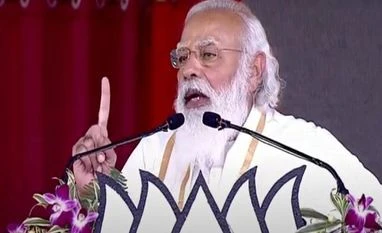Launching a frontal attack on the Mamata Banerjee government, Prime Minister Narendra Modi alleged on Monday it has perpetuated "syndicate raj" in all spheres of life in West Bengal where no work gets done without common people having to pay "cut money".
He accused the TMC government of pursuing "appeasement politics" to protect its vote bank while neglecting its cultural heritage and icons.
"The state government's cut money culture has vitiated the atmosphere to such an extent that you cannot even take a house on rent without paying it....you cannot rent a house without the syndicate's permission," he said.
He attacked the Banerjee government for not allowing central schemes like the PM Kisan Samman Nidhi and Ayushman Bharat, depriving farmers and the poor of its benefits.
"I have been told the house where Bankim Chandra Chattopadhyay conceived and wrote 'Vande Mataram' is in an abysmal condition. The man who injected new life into the freedom struggle amid pervasive gloom of slavery...his house is a victim of neglect. It's an insult to Bengali pride," Modi said addressing a public rally here in Hooghly district.
He also accused the TMC government of neglecting industrial development, including the state's once thriving jute industry.
More From This Section
r"The people of West Bengal have made up their mind to usher in 'asol poribartan' (real change). The BJP will give Bengal a government that will ensure development of all but appeasement of none," he asserted.
Repeatedly attacking the state government, Modi said, "Development of Bengal is not possible as long as cut money culture, tolabaji persists.
"Development of Bengal is not possible as long as the state administration patronises goondas, development of Bengal is not possible as long as the rule of law is not established."
Modi said once the BJP forms its government in Bengal, people will be able to preserve and protect their culture and nobody will be able to scare or suppress them.
He said there was no dearth of potential investors but the threat of the syndicate and cut money dissuaded them from investing in the state.
)